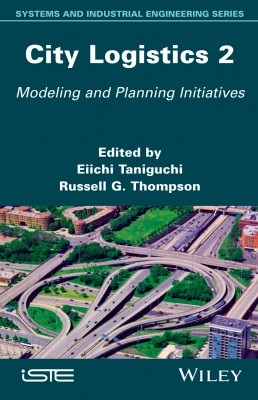
This is the second of a three-volume series of books describing the new opportunities and challenges of city logistics, based on papers presented at the Tenth International Conference on City Logistics, 14–16 June 2017, Phuket, Thailand.
City logistics aims to balance economic growth, better environmental practices and safer communities associated with urban freight transport. To achieve these goals, a number of smart solutions using ICT (Information and Communication Technology), ITS (Intelligent Transport Systems) and the IoT (Internet of Things) are presented and discussed in this book. Recent advances in modeling, planning and evaluating city logistics initiatives are also outlined.
Collaboration with public authorities, private sectors and residents is a key issue and organizational and operational points are discussed based on experience in practice. A number of case studies on city logistics in many cities throughout the world are presented and analyses on their successes and problems are described.
This book will encourage researchers, as well as practitioners who are interested in city logistics, to investigate complicated problems relating to urban freight transport in order to find improved solutions for more sustainable and liveable cities.
1. Urban Logistics Spaces: What Models, What Uses and What Role for Public Authorities?,
Danièle Patier and Florence Toilier.
2. Dynamic Management of Urban Last-Mile Deliveries, Tomislav Letnik,
Matej Mencinger and Stane Bozicnik.
3. Stakeholders’ Roles for Business Modeling in a City Logistics Ecosystem: Towards a Conceptual Model,
Giovanni Zenezini, J.H.R. Van Duin, Lorant Tavasszy and Alberto De Marco.
4. Establishing a Robust Urban Logistics Network at FEMSA through Stochastic Multi-Echelon Location Routing,
André Snoeck, Matthias Winkenbach and Esteban E. Mascarino.
5. An Evaluation Model of Operational and Cost Impacts of Off-Hours Deliveries in the City of Sao Paulo, Brazil,
Cláudio B. Cunha and Hugo T.Y. Yoshizaki.
6. Application of the Bi-Level Location-Routing Problem for Post-Disaster Waste Collection,
Cheng Cheng, Russell G. Thompson, Alysson M. Costa and Xiang Huang.
7. Next-Generation Commodity Flow Survey: A Pilot in Singapore,
Lynette Cheah, Fang Zhao, Monique Stinson, Fangping Lu, Jing Ding-Mastera, Vittorio Marzano, and Moshe Ben-Akiva.
8. City Logistics and Clustering: Impacts of Using HDI and Taxes,
Rodrigo Barros Castro, Daniel Merchán, Orlando Fontes Lima Jr and Matthias Winkenbach.
9. Developing a Multi-Dimensional Poly-Parametric Typology for City Logistics,
Paulus Aditjandra and Thomas Zunder.
10. Multi-agent Simulation with Reinforcement Learning for Evaluating a Combination of City Logistics Policy Measures,
Eiichi Taniguchi, Ali Gul Qureshi and Kyosuke Konda.
11. Decision Support System for an Urban Distribution Center Using Agent-based Modeling: A Case Study of Yogyakarta Special Region Province, Indonesia,
Bertha Maya Sopha, Anna Maria Sri Asih, Hanif Arkan Nurdiansyah and Rahma Maulida.
12. Evaluating the Relocation of an Urban Container Terminal,
Johan W. Joubert.
13. Multi-Agent Simulation Using Adaptive Dynamic Programing for Evaluating Urban Consolidation Centers,
Nailah Firdausiyah, Eiichi Taniguchi and Ali Gul Qureshi.
14. Use Patterns and Preferences for Charging Infrastructure for Battery Electric Vehicles in Commercial Fleets in the Hamburg Metropolitan Region,
Christian Blusch, Heike Flämig and Sören Christian Trümper.
15. The Potential of Light Electric Vehicles for Specific Freight Flows: Insights from the Netherlands,
Susanne BALM, Ewoud MOOLENBURGH, Nilesh ANAND and Walther Ploos Van Amstel.
16. Use of CNG for Urban Freight Transport: Comparisons Between France and Brazil,
Kelli De Oliveira and Diana Diziain.
17. Using Cost–Benefit Analysis to Evaluate City Logistics Initiatives: An Application to Freight Consolidation in Small- and Mid-Sized Urban Areas,
Johan Holmgren.
18. Assumptions of Social Cost–Benefit Analysis for Implementing Urban Freight Transport Measures,
Izabela Kotowska, Stanislaw Iwan, Kinga Kijewska and Mariusz Jedlinski.
19. Barriers to the Adoption of an Urban Logistics Collaboration Process: A Case Study of the Saint-Etienne Urban Consolidation Centre,
Kanyarat Nimtrakool, Jesus Gonzalez-Feliu and Claire Capo.
20. Logistics Sprawl Assessment Applied to Locational Planning: A Case Study in Palmas (Brazil),
Lilian dos Santos Fontes Pereira Bracarense, Thiago Alvares Assis, Leise Kelli De Oliveira and Renata Lúcia Magalhaes De Oliveira.
21. Are Cities’ Delivery Spaces in the Right Places Mapping Truck Load/Unload Locations,
Anne Goodchild, Barb Ivanov, Ed Mccormack, Anne Moudon, Jason Scully, José Machado Leon and Gabriela Giron Valderrama.
Eiichi Taniguchi is Professor Emeritus in Transport and Logistics at Kyoto University, Japan.
Russell G. Thompson is Associate Professor in the Department of Infrastructure Engineering at The University of Melbourne, Australia.